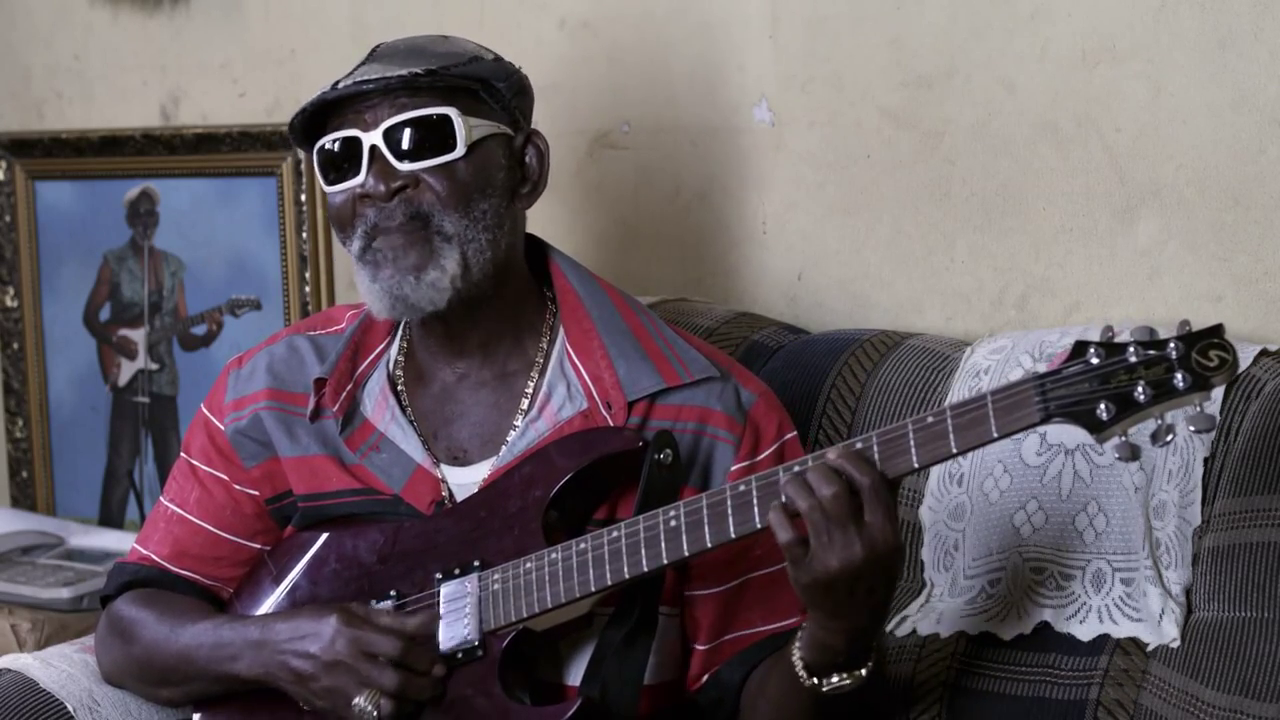In one of the earliest scenes of Elder’s Corner, the culturally significant, long in the works documentary about Nigeria’s forgotten musical heroes, highlife maestro Sir Victor Uwaifo summarizes the film’s central thesis with the following words. “It must be the devil’s trick to be born in a country where neither soul nor talent is appreciated,”
And he should know.
A prominent feature of post-colonial Nigeria was a remarkable fondness for everything white. This included western education and white-collar jobs, leading to the demonization of certain informal professions. For some reason, artists were among the most reviled. Kids were discouraged from pursuing careers in the creative sector. Artistes got no respect and were considered up to no good. Little value was placed on the arts and creatives often struggled to make a decent living in a society that took what they needed from them- their talent- and tossed them aside.
It is a lot different now of course. Afrobeat is going global, Netflix is invested in Nollywood and entertainers have clawed their way into respectability. Parents are likely to fancy their wards as the next Wizkid or Burna Boy and even encourage them. But where does this leave the generations of musicians that arrived earlier?
Born in London and raised in Nigeria, musician and filmmaker, Siji Awoyinka does a national service digging into memory and cultural history as he attempts to answer this question. It is said that a society can be judged by how it treats its most vulnerable. The senior citizens profiled in this documentary are some of the most vulnerable species. Not only are they the surviving crop of a generation fast dying out, they also represent some of the finest musicians the country has ever produced. They came of age in colonial Nigeria and individually and collectively, charted the sound of the country. From highlife to juju, akwete, funk, afrobeat and even classical music, theirs was the music that documented Nigeria’s history, providing the foundations for today’s sound. Nigeria does not treat them well. What does that say about Nigeria?
The seeds of Elder’s Corner were planted over a decade ago in New York City where Awoyinka came across rare 45 vinyl records of classic Nigerian music at a friend’s apartment. The lush and fertile sounds. This includes a first edition copy of Won Kere Si Number Wa by the late great Fatai Rolling Dollar which transported Awoyinka back to priceless memories of growing up in Nigeria. Realizing that terrible record keeping and a dismal appreciation of the arts had rendered a great deal of these valuable recordings lost, perhaps forever, Awoyinka resolved to head back to Nigeria to find these legends and document their stories.
Elder’s Corner, which debuted at the Sheffield documentary festival and has made the rounds at Doc NYC and BlackStar film festival, eventually gulped ten years of Awoyinka’s life. Within this time frame, many of the subjects he interviewed passed away. But the footage that emerges from those hours of interviews is golden, and deserves the attention it garners.
Awoyinka documents interview sessions with Victor Olaiya, E.C Arinze, Mary Afi Usuah, Tony Allen, Chief Commander Ebenezer Obey, Chris Ajilo, the Lijadu sisters and Jimi Solanke amongst others. They speak frankly about their lives and career as well as their complicated relationship with the country.
For many of them, forgotten and impoverished, it is little wonder that they have fond memories of the colonial era where at least some semblance of order seemed to exist. They trace the downfall of the Nigerian project to independence in 1960. The stories that the elders tell are wonderful archival assets, easily worth the price of admission to Elder’s Corner.
There are tales of triumph, hard work, excellence, success and patriotism; all virtues that would come to be useful in building a country from scratch. But look out also for pain, suffering and regret. Particularly heartbreaking in light of today’s immigration sentiments is the late Afi Usuah who died in 2013. Afi Usuah’s talent had taken her to a promising life in Italy. Patriotic sentiments succeeded in luring her back home. The pain of regret remains palpable in her voice as she speaks with Awoyinka.
The conditions and post-fame realities of the lives of these veterans would make for some depressing viewing. But Awoyinka with the assistance of his collaborators, is able to find joy in the lives that they lived, the memories they shared and the music they left behind.
Calling on his musical instincts, Awoyinka gathers some of the surviving folks and in what must be a musician’s fantasy, collaborates with them in the re-recording some of their classics. These jam sessions which elevate the film and give it much of its swing, are recorded in the storied DECCA studios, now owned by Ebenezer Obey. Chief Commander Obey’s inclusion is instructive also. Beyond jolting the film with the magnetic pull of his star power, he serves as the rare elder who remains just as successful in the twilight of his life.
In the way that it embraces the documentary format and purposes it as both historical document and cultural activism, Elder’s Corner can be considered kin to Questlove’s Sundance winning Summer of Soul (…Or, When The Revolution Could Not Be Televised) which brings to light a forgotten cultural event. While Elder’s Corner is not as technically accomplished and Awoyinka not as assured a filmmaker, his film exists as a necessary and no less powerful cultural intervention. For what better way to map a country’s history than through its music and the fascinating people who made them?
Wilfred Okiche is a Nigerian film and theatre critic based in Lagos. He has mentored film critics at the Durban International Film Festival. He has participated in critics training programs in Berlin, Rotterdam, Locarno and Stockholm. He is a member of FIPRESCI.
